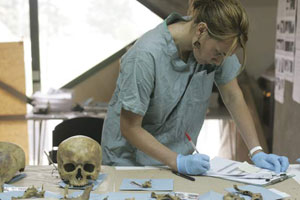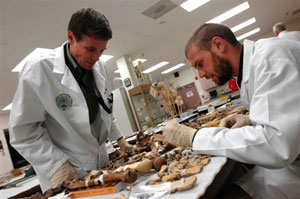Anthropologist
Tasks & duties

Anthropologists may do some or all of the following:
-
compare different societies and cultures
-
study their own and other societies
-
carry out fieldwork, which may involve living with and studying people of different cultures
-
observe and record family and group relationships and activities
-
gather information on the culture, behaviour, language, economics and biology of societies and individuals
-
study items from the past and the present to find out more about societies
-
develop and test new ideas
-
write and present research findings
-
may advise government departments and private organisations on cultural matters and the concerns of different groups and cultures
-
assess the effect of the environment on individuals and societies, such as the impact of globalisation on Third World countries
-
may teach anthropology
Skills & knowledge

Anthropologists need to have:
-
knowledge of the theories of anthropology and anthropological research methods
-
knowledge of various cultures and societies
-
in-depth knowledge of a specialist area of anthropology
-
research skills, including the ability to analyse and interpret information
-
oral and written communication skills
-
people skills
-
planning and organisational skills
Anthropologists should be prepared to learn new languages so that they can carry out research and fieldwork effectively.
Entry requirements
To become an anthropologist you need to have a Master of Arts or a Master of Social Science majoring in anthropology. A doctorate in anthropology is preferred for most academic positions.
Secondary education
A tertiary entrance qualification is required to enter tertiary training. Useful subjects include English, languages, history, geography and biology.
Training on the job
Many skills and research methods are learned during tertiary training, but you also gain many skills on the job. Once qualified, anthropologists are expected to do ongoing training and keep up to date with developments in anthropology theory and practice.
Useful experience
Useful experience includes any research and writing work, museum work, or experience with foreign languages and cultures.
Related courses
Anthropology
Cultural Studies
Foreign Languages
Sociology
For more information, please refer to Career Services.
Document Actions
